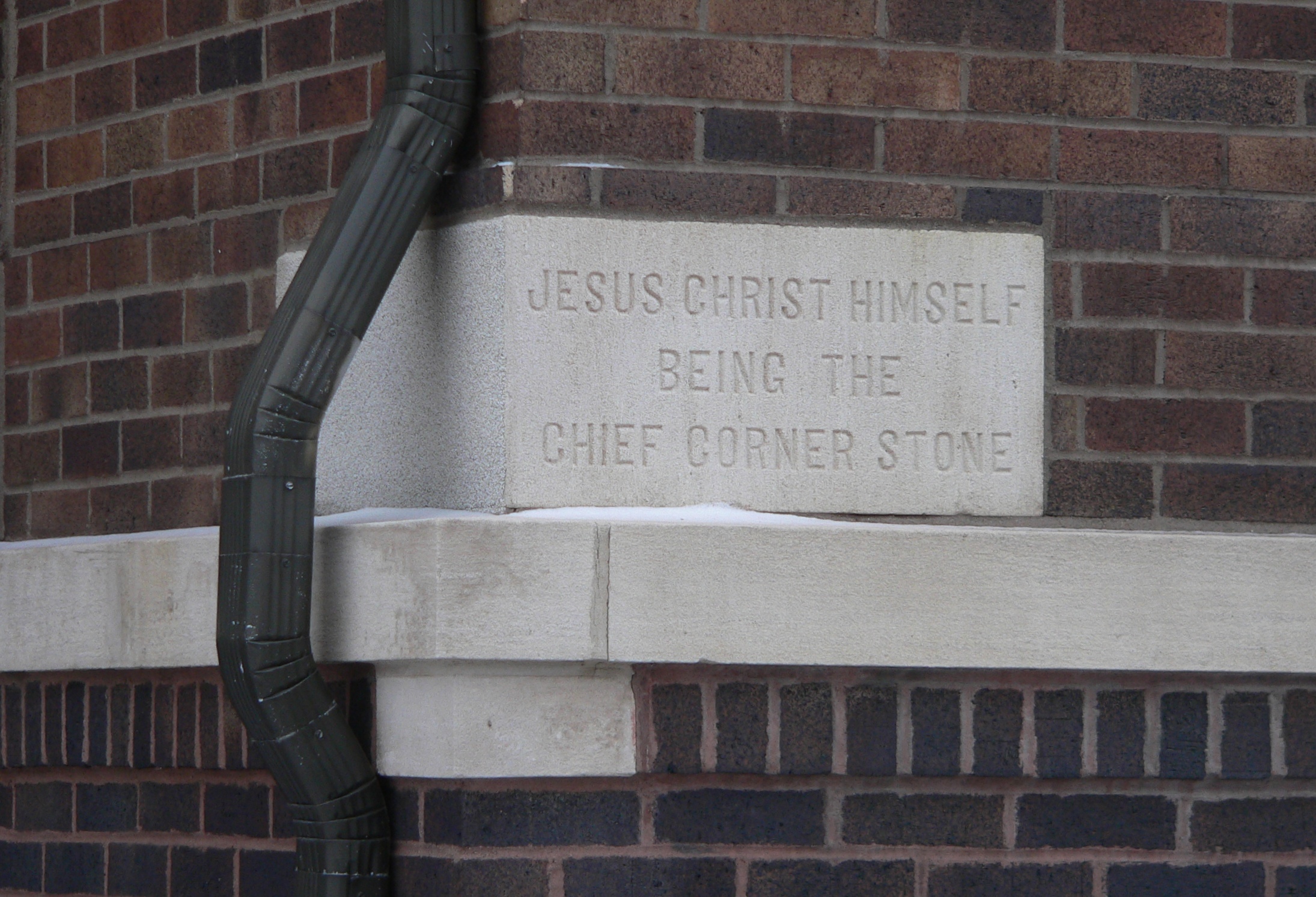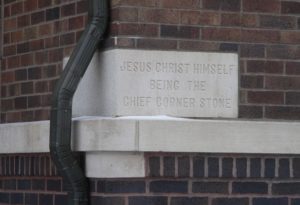Jesus is the Cornerstone
Devotions on Ephesians 2:11-22
Monday–Jesus is the Cornerstone
“Remember that you were at that time without Christ, being aliens from the commonwealth of Israel” (Ephesians 1:12a).
Eduardo was a Peruvian living legally in the United States. Many people called Eduardo an alien and he certainly felt like one. His dark skin, native facial features and accent were reasons for people to separate and exclude Eduardo. Koharu was a math whiz and valedictorian of her class. She was not included in many of her class’s activities because she was judged to be too smart. After an auto accident, Jeff was left paralyzed from the waist down. His disability made people uncomfortable and he was rarely invited to participate in activities.
Most of us have found ourselves on the outside looking in. This was certainly the plight of the Gentiles in Ephesus, to whom Paul was writing. They were not God’s Children. God had not given them circumcision, kosher eating, the Sabbath and the Torah. Such barriers were artificial barriers, though, from God’s point of view. God didn’t see people as part of the in group or out group. God saw everyone as part of God’s creation and objects of God’s love.
People may tell us that we are out, but thanks be to God, we are in. We may be tempted to judge people and mark them as outsiders. Let us remember, though, that in God’s eyes, everyone is a child of God.
As we celebrate our inclusion into your family, enable us to celebrate that everyone is a child of God. Amen.
Tuesday–Jesus is the Cornerstone
“Having no hope without God in the world” (Ephesians 2:12b).
In the movie “City Slickers,” Billy Crystal plays Mitch, a middle-age ads salesman going through a midlife crisis. In an attempt to find himself Mitch, signs up for a “dude trail drive” moving cattle from New Mexico to Colorado. On the drive, Mitch meets Curly who teaches Mitch how to be a real cowboy and that life needs to have one thing to hold it together. Many people are like Mitch in search of that one illusive thing that gives life meaning. Paul would say that they have no hope and are without God in the world.
Our understanding that God is a God of love, who wills that everyone live in a relationship with God, may not motivate us to get people to accept Jesus so that they can escape eternal damnation. As followers of Jesus though, we still have a reason to share the good news of God’s love and grace with others. Living with God and serving God, has given us a meaning and purpose in our lives. We have found the one thing that holds life together—the one thing so many of our family, friends, neighbors and co-workers seek.
Lord, empower us so that our words and actions give the people around us hope and meaning. Amen.
Wednesday–Jesus is the Cornerstone
“He is our peace … and has broken down the dividing wall” (Ephesians 2:14).
There is an old story about two feuding brothers. One of the brothers had a load of wood and hired an itinerant carpenter to build a wall to enforce the separation between him and his brother. Several day later the brother went to inspect the carpenter’s workmanship. He discovered that the carpenter had not used the wood to build a wall, but instead had used it to build a bridge. Free to cross over the gap between them, the brothers were reconciled with each other.
There are times when we want Jesus to build walls between us—conservative evangelicals and progressive Christians, conservatives and liberals, straights and gays, rich and poor, Christians and Muslims. Jesus refuses to do so. Through his life, death and resurrection, Jesus has built bridges rather than walls. We can no longer excuse ourselves by saying the walls are too high. Instead we must confess that we refuse to cross the bridges. In contrite humility, we bow and ask God to give us the will to take the first steps to traverse the bridges.
Forgive us, Lord, when we are content with the division among us. Empower us to action so that the divisions are healed. Amen.
Thursday–Jesus is the Cornerstone
“He has abolished the law with its commandments and ordinances” (Ephesians 2:15).
In the beginning there were ten. Ten laws, which had been given to us by God, to enable us to live together. Those laws, however, multiplied into the hundreds. There were laws that told us what we could and couldn’t do on the Sabbath, what to eat, how to make proper sacrifices. Laws told us when and how to have sex and, of course, we had laws telling us who we should include and exclude in our lives. We got so caught up in keeping all those laws, thinking that we were pleasing God, that we did some very ungodly things. We hated people, judged people. Thinking we were keeping the law, we even killed people in the name of God.
When Jesus came, he put an end to that. He gave his followers only one commandment, which was to love one another. Now we don’t need to be so afraid of breaking all of those laws. Instead, we can focus on observing the one law—to love. Jesus even gives us an example by his life, death and resurrection of what he means when he commands us to love one another. Life may be simpler, but it still remains challenging.
Holy Spirit, use our word and actions to share the love that you pour into our lives. Amen.
Friday–Jesus in the Cornerstone
“For through him both of us have access in one Spirit to the Father” (Ephesians 2:10).
It is common to use entrance points to separate rather than unite. Family and friends can go in the back door, while guest enter by the front. There’s usually a servants entrance in mansions. During the days of Jim Crow, whites would enter a building through one door and blacks through another. In the time when Jesus walked the earth, Gentiles could enter only specific spots in the outer ring of the temple. Jewish men could enter through doors into the inner, more holy areas of the temple.
Imagine the chagrin some people must have when they approach God. We enter God’s presence through the same Spirit. There are no back doors or express lines. When we enter God’s presence, we find ourselves standing beside the homeless, the transgender, the super-rich, the Arab and Latino, perhaps even the Muslim and the Buddhist. When we come before God, we are all one people. Because of Jesus’ life, death and resurrection, we all have access to God through the one Spirit. There is no better picture of unity.
May you help us, Lord, give thanks for all that unites us and ignore those things that divide us. Amen.
Saturday–Jesus is the Cornerstone
“With Christ Jesus himself as the cornerstone” (Ephesians 2:20).
A key element in Roman architecture is the arch. The Romans didn’t invent the arch, but they used it in many different ways. They used it in buildings for doors and windows and also used the arch for bridges and aqueducts. In the middle of each arch is a trapezoidal shaped brick called the “keystone.” All of structural force of the arch is centered on the keystone. If the keystone is removed the arch collapses.
Under Roman occupation, the Jews (and Paul) were well aware of the Roman Arch. That is why Paul identifies Jesus as the keystone to the Christian church and the fellowship of Christians. If you take away Jesus, the purpose of the church is removed and the unifying element of Christian fellowship disappears. The church collapses.
There is a popular bumper sticker that appears around Christmas time. It says, “Jesus is the reason for the season.” In a sense, that statement is only partially true. It can be expanded to simply say, “Jesus is the Reason.” Jesus is the reason for the church. Jesus is the reason for our worship and our service. Our works of charity are because of Jesus. The reason why we share our blessings with others is because of Jesus. Truly, Jesus is the keystone of life.
Jesus, you are our reason for living. Move within us so that our lives reflect this reality. Amen.
Sunday–Jesus is the Cornerstone
“In whom you also are built together spiritually into a swelling place for God” (Ephesians 2:22).
Ask any Israelite from 950 BCE where God was and they’d point to the temple in Jerusalem. God lived on Mount Zion in the Holy of Holies in the Temple. One of the reasons why the sacking of Jerusalem and the destruction of the temple by the Babylonians was so devastating to the Israelites was that they did not know where God was—God’s dwelling place was destroyed. For centuries, Christians referred to their church and cathedrals as “God’s House.” A person went to the church to be near God, or to find God.
Paul understands God’s dwelling place to be in a different location than a physical structure. To the Christians in Corinth, he writes that their bodies are temples of the Lord (1 Corinthians 6:19). To the Ephesians, Paul writes that the people of God are built together as God’s dwelling place. Sometimes we might question what Paul writes. We see the brokenness of our congregational fellowships—the arguments, the politics and on occasion the unchristian behavior. Yet, in our brokenness, just like in our struggles and hard times, God comes close and is revealed.
We are not responsible for the words and actions of others, nor can we change them. We can, however, live our lives in the reality that the Christian fellowship, of which we are parts, are dwelling places of God. May God’s Spirit shine through us.
We pray, Lord, for our brothers and sisters in Christ—that even in our brokenness your love and grace may shine through all of us. Amen.


